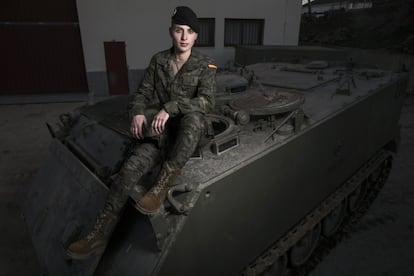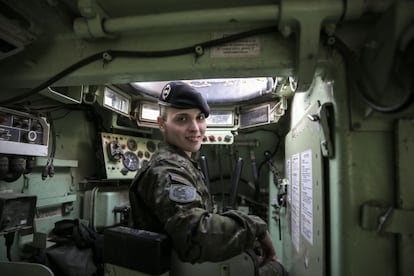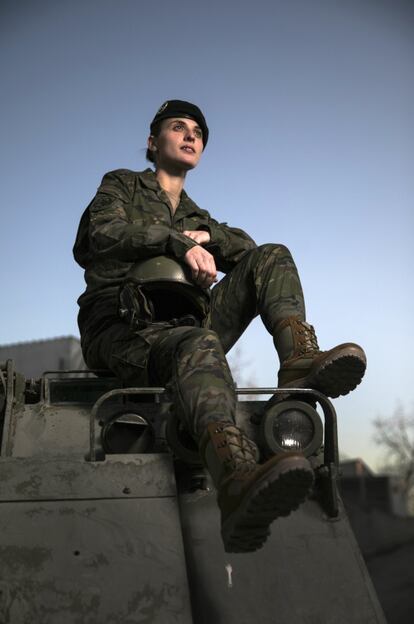I’m 24 and a soldier in an infantry unit
Natalia Ortiz is one of the growing number of people who see the Armed Forces as a vocation

Natalia, 24, is a fashionista. She has always liked clothes and creating her own style. Natalia is one of those people who feels comfortable in Nike sneakers, a dress and a dash of makeup. She tells us this while dressed in military uniform, complete with an army cap and black combat boots. Over her left breast pocket is a green patch that reads “Ortiz”, the young soldier’s last name.
Natalia is one of the few millennials to belong to the Spanish Armed Forces, which have been downsizing troop numbers for years. From 2008 to 2015, the number of troops was reduced by 8% to a total of 121,848. What’s more, there are fewer openings for new recruits: the number of positions for soldiers and marines for people aged between 18 and 20 has dropped from 16,000 in 2009, to 1,500 in 2016. But this doesn’t mean that there are fewer people interested. In the past few years, there were around 40,000 applicants.
In 2017 women made up 12.6% of the troops
January of 2018 will mark the 30th anniversary of the incorporation of women into the Armed Forces. In 2017 alone, women made up 12.6% of troops, according to Ministry of Defense statistics. Natalia Ortiz is one of 15,305 Spanish soldiers at the El Goloso military base, the headquarters of the XII Guadarrama Brigade of the armored infantry unit.
Between the ages of five and 17, Natalia trained in rhythmic gymnastics, even competing at a national level. But she gave it up because it didn't seem difficult enough. It was not her only passion. As a child, Natalia also wanted to be an actress but she saw that it was a tricky career to get into: “You have to know a lot of people from that world if you want to be able to develop in it.”

Two of her neighbors in the Leganés suburb in Madrid were members of the Armed Forces. Alongside her mother, who shared her enthusiasm and admiration for the military, she went to watch them be sworn in. “I got goosebumps, seeing army personnel has always stirred up so much emotion in me, it’s a very beautiful thing,” she remembers. When she was 16 she decided to answer a question that had tossed and turned in her mind for years: “What if I am meant to be a soldier?”. After much thought, she decided that it was something she wanted. But before she joining, she studied a degree in image consulting – finally scratched the fashion itch she’d had since her youth. She confesses: “I enjoyed it a great deal.”
I don’t have a single friend or family member who is opposed to the idea. They are proud that I can represent them
The first time she applied to be a soldier, in 2014, she didn’t make the cut. A year later she got in, and under the guidance of her neighbors in the military, she decided to join the transmission section which is dedicated to managing telecommunications of the military bases in combat zones. Her loved ones were not surprised: “I don’t have a single friend or family member who is opposed to the idea. Quite the opposite actually, they are proud that I can represent them,” she says. “I haven’t found anyone who tells me that a life in the army is a mistake. It’s a profession you have to respect because it's part of a very institution that is there because it has to be.” According to a 2015 survey from the Center for Sociological Research (CIS), 60.9% of Spaniards have a good or very good opinion of the Armed Forces.
While she has not had any bad experiences, the soldier tries not to leave the house dressed in military clothes just to be safe: “There are bad people out there too.” As far as her routine outside the military base goes, she explains that the ‘once a soldier always a soldier’ attitude perhaps pushes people her age away from her. “You can’t do anything crazy because you are representing an institution. A civilian can do whatever they want. I like to have fun like anyone else, but we have certain values that we have to uphold.”
Although she is a millennial, there are other things about her that separate her from people her age – beyond her unusual occupation. For instance, she has little interest in social media: “I only have Facebook but more than anything else I use it to find information.”
Every day at 7 in the morning she trains at El Goloso military base and after her shift, she goes for a run. She also leaves time to learn English, “because it’s very important to know languages if you are a soldier.”

Of the 25 soldiers who make up her squad, only four are women. “The fact that I am a woman has not made me insecure, on the contrary, it motivated me to push myself harder”. Nevertheless, job insecurity affects women nire than in their male counterparts: As El País published, less than one out of four women have a permanent contract, as opposed to almost one out of every two men.
She also disagrees with the outdated ideas people have about the army. “The army isn’t what it was 30 years ago, now we are here because we want to be, we are better trained and we are more up to date. Before people joined because they had to, now more people see it as a vocations and this is seen a lot when it’s time to put in the work. If you are forced to do something, you will do it unwillingly, but if you are volunteering, you do your job well and professionally.”
Natalia wants to be put in a combat zone. “Like any soldier,” she says. “For us it is a moment of truth, we train all year for this.” This year, there are missions in Latvia and in 2019 in Lebanon. Ortiz is applying to be part of both. “We risk our lives more than someone in an office or a shop. But it's because the way we see it, we are protecting you all. There have to be people to do this and to help the army in conflict zones.”
English version by Laura Rodriguez
Tu suscripción se está usando en otro dispositivo
¿Quieres añadir otro usuario a tu suscripción?
Si continúas leyendo en este dispositivo, no se podrá leer en el otro.
FlechaTu suscripción se está usando en otro dispositivo y solo puedes acceder a EL PAÍS desde un dispositivo a la vez.
Si quieres compartir tu cuenta, cambia tu suscripción a la modalidad Premium, así podrás añadir otro usuario. Cada uno accederá con su propia cuenta de email, lo que os permitirá personalizar vuestra experiencia en EL PAÍS.
¿Tienes una suscripción de empresa? Accede aquí para contratar más cuentas.
En el caso de no saber quién está usando tu cuenta, te recomendamos cambiar tu contraseña aquí.
Si decides continuar compartiendo tu cuenta, este mensaje se mostrará en tu dispositivo y en el de la otra persona que está usando tu cuenta de forma indefinida, afectando a tu experiencia de lectura. Puedes consultar aquí los términos y condiciones de la suscripción digital.









































